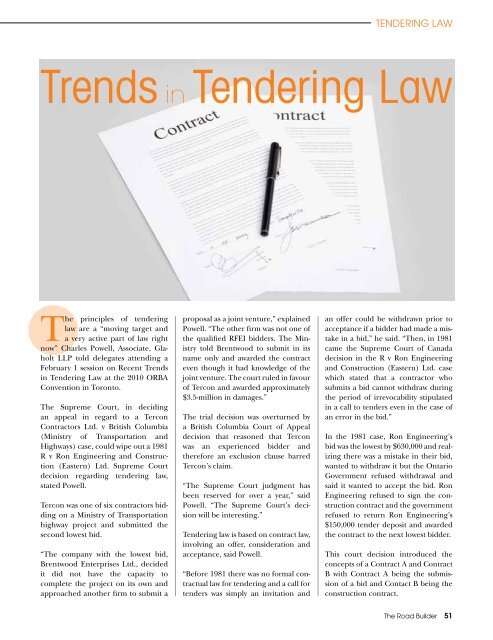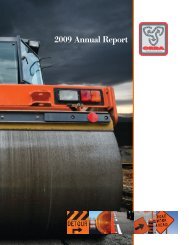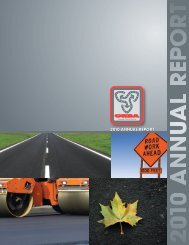Spring Summer 2010 Issue - Ontario Road Builders' Association
Spring Summer 2010 Issue - Ontario Road Builders' Association
Spring Summer 2010 Issue - Ontario Road Builders' Association
Create successful ePaper yourself
Turn your PDF publications into a flip-book with our unique Google optimized e-Paper software.
TENDERING LAW<br />
Trends in Tendering Law<br />
The principles of tendering<br />
law are a “moving target and<br />
a very active part of law right<br />
now” Charles Powell, Associate, Glaholt<br />
LLP told delegates attending a<br />
February 1 session on Recent Trends<br />
in Tendering Law at the <strong>2010</strong> ORBA<br />
Convention in Toronto.<br />
The Supreme Court, in deciding<br />
an appeal in regard to a Tercon<br />
Contractors Ltd. v British Columbia<br />
(Ministry of Transportation and<br />
Highways) case, could wipe out a 1981<br />
R v Ron Engineering and Construction<br />
(Eastern) Ltd. Supreme Court<br />
decision regarding tendering law,<br />
stated Powell.<br />
Tercon was one of six contractors bidding<br />
on a Ministry of Transportation<br />
highway project and submitted the<br />
second lowest bid.<br />
“The company with the lowest bid,<br />
Brentwood Enterprises Ltd., decided<br />
it did not have the capacity to<br />
complete the project on its own and<br />
approached another firm to submit a<br />
proposal as a joint venture,” explained<br />
Powell. “The other firm was not one of<br />
the qualified RFEI bidders. The Ministry<br />
told Brentwood to submit in its<br />
name only and awarded the contract<br />
even though it had knowledge of the<br />
joint venture. The court ruled in favour<br />
of Tercon and awarded approximately<br />
$3.5-million in damages.”<br />
The trial decision was overturned by<br />
a British Columbia Court of Appeal<br />
decision that reasoned that Tercon<br />
was an experienced bidder and<br />
therefore an exclusion clause barred<br />
Tercon’s claim.<br />
“The Supreme Court judgment has<br />
been reserved for over a year,” said<br />
Powell. “The Supreme Court’s decision<br />
will be interesting.”<br />
Tendering law is based on contract law,<br />
involving an offer, consideration and<br />
acceptance, said Powell.<br />
“Before 1981 there was no formal contractual<br />
law for tendering and a call for<br />
tenders was simply an invitation and<br />
an offer could be withdrawn prior to<br />
acceptance if a bidder had made a mistake<br />
in a bid,” he said. “Then, in 1981<br />
came the Supreme Court of Canada<br />
decision in the R v Ron Engineering<br />
and Construction (Eastern) Ltd. case<br />
which stated that a contractor who<br />
submits a bid cannot withdraw during<br />
the period of irrevocability stipulated<br />
in a call to tenders even in the case of<br />
an error in the bid.”<br />
In the 1981 case, Ron Engineering’s<br />
bid was the lowest by $630,000 and realizing<br />
there was a mistake in their bid,<br />
wanted to withdraw it but the <strong>Ontario</strong><br />
Government refused withdrawal and<br />
said it wanted to accept the bid. Ron<br />
Engineering refused to sign the construction<br />
contract and the government<br />
refused to return Ron Engineering’s<br />
$150,000 tender deposit and awarded<br />
the contract to the next lowest bidder.<br />
This court decision introduced the<br />
concepts of a Contract A and Contract<br />
B with Contract A being the submission<br />
of a bid and Contact B being the<br />
construction contract.<br />
The <strong>Road</strong> Builder 51




